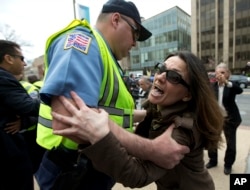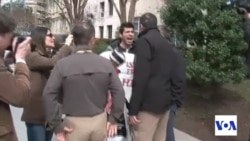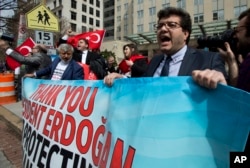U.S. President Barack Obama on Thursday assured his Turkish counterpart of American commitment to the security of Turkey, a critical ally in the fight against the Islamic State group.
In a Thursday night meeting on the sidelines of a nuclear security summit in Washington, Obama and Turkish leader Recep Tayyip Erdogan discussed their strategies against IS extremists, according to the White House.
Obama also extended condolences to Erdogan for a terrorist attack earlier in the day in the Kurdish-majority southeastern city of Diyarbakir, where seven policemen were killed and at least 27 people were wounded.
Earlier Thursday, U.S. Vice President Joe Biden met Erdogan. Turkish officials expressed disappointment about the two sides' disagreement over Syrian Kurdish YPG militia.
The YPG is the armed branch of Syria’s powerful Kurdish Democratic Union Party (PYD). The U.S. views the PYD as an efficient combatant against Islamic State terrorists in northern Syria. However, Turkey says the PYD is aligned with the Kurdistan Workers' Party (PKK), a militant leftist group fighting for autonomy in southeastern Turkey. Ankara considers the PKK a terrorist group.
After the two leaders' meeting, chaos erupted between Turkish security and protesters outside the Brookings Institution, a Washington think tank at which Erdogan was giving a speech.
Media reports said a journalist was removed from the event site by Turkish security personnel, and another was kicked by a guard.
"The United States strongly supports freedom of the press and independent media in every country in the world, including Turkey," Rhodes said.
He said that he didn't know the specifics of the Brookings incident, but that the U.S. had voiced concerns in the past regarding measures taken against journalists inside Turkey and would continue to raise the issue with Ankara.
Biden visited Turkey earlier this year, where he criticized the country's leaders for cracking down on freedom of expression.
He said the Turkish government was not setting the right "example" with its imprisonment of journalists and investigation of academics who have criticized the government's military campaign against Turkey's Kurdish-dominated southeastern sector.








